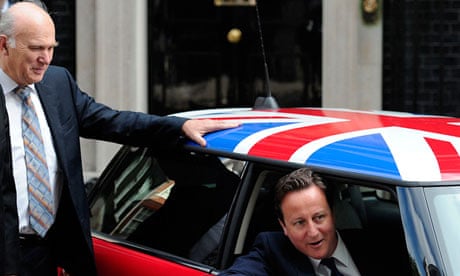David Cameron will on Thursday come under attack from Vince Cable as the business secretary accuses him of choosing "a terrible time" to raise the threat of Britain's exit from the EU, saying the prime minister's strategy "will add to the sense of an unresolved economic crisis in the UK".
Ministers privately admitted that Cameron's speech on Friday in the Netherlands was the result of a mistake last summer by the prime minister, and has raised expectations to a level that will be hard to meet.
On another day when Cameron's strategy was challenged by some in his own party, his Liberal Democrat coalition partners, and even his Dutch hosts, the PM briefed a cabinet and senior MPs on the contents of his definitive statement of his Euro beliefs.
The speech will include a restatement of his belief that Britain should remain inside a reformed EU, set out some specific negotiating demands and promise a referendum in the next parliament. Ministers hope details of the Tories' specific demands can be delayed until the European elections in 2014.
They hope to include one piece of red meat to satisfy the appetites of the Eurosceptics, notably an admission that Britain could survive outside the EU. They concede the Cameron speech may have spiralled out of control, and was largely the product of an article that appeared in the Sunday Telegraph written to compensate for remarks he made at a press conference in Brussels opposing Britain's exit from the EU.
In the runup to the speech, a group of prominent City figures have written to the Telegraph in support of an in-out referendum, and a group of 30 pro-European Tory MPs, including Ken Clarke and Sir Malcolm Rifkind, have written a letter charging the prime minister with jeopardising Margaret Thatcher's foremost European legacy, the single market, and of doing Britain a disservice by failing to lead in Europe.
The MPs warn: "We fear that a renegotiation which seems to favour the UK alone would force other capitals to ask why they cannot simply dispense with those parts of the single market that don't suit them, potentially endangering Margaret Thatcher's defining European legacy."
But attention is likely to focus on Cable's speech in Oxfordshire accusing Cameron of self-inflicted damage and a dangerous gamble that could throttle the UK's return to growth. The business secretary will warn: "It will be difficult enough to safeguard UK national interests in the single market in an environment where the UK stands aside from closer economic and political integration in the eurozone. It could become next to impossible if the UK is simultaneously seeking to disengage from substantial existing commitments, especially if we are perceived to be blocking closer integration in projects we are not part of.
"The Eurosceptic calculation is that British permission is necessary for closer integration – via treaty change – and that this permission can be traded for the negotiating objectives. That seems to me a dangerous gamble to make.
"There are many in Europe, notably in France, who would be happy to see the back of the UK – whatever that may mean in practice – and even the UK's allies on market reform, notably Germany, have limited political capital to spend getting a more favourable arrangement for the UK."
Cable will say it is legitimate for Britain to seek reforms, but this process "is not helped by threats to walk out when we don't get our way".
He concedes that a referendum could "lance the boil of suspicion that British membership is primarily supported by a deracinated Europhile elite disconnected from and distrustful of the public".
But he will add: "What is clear is that this is a terrible time to have the diversion and uncertainty which build up to a referendum would entail.
"It is far from clear what the rival propositions actually mean. We simply do not know what structures and governance will emerge from the eurozone crisis or what it means for the UK.
"It is totally unclear whether the other members of the EU will be willing to negotiate new terms for the UK and on what basis. Uncertainty is the enemy of investment.
"At a time of extreme fragility in business confidence such uncertainty would add to the sense of unresolved crisis and weaken Britain's ability to deliver more reform inside the EU."
Cameron's claims that he has allies in Europe, notably his Dutch hosts, came apart as the Dutch foreign minister Frans Timmermans said: "The Netherlands is not in favour of opt-outs, we have never been. We have seen before, in other areas, that the British were in favour of opt-outs. The Netherlands has never gone for that."
He added that he wanted Britain inside the EU, saying the Netherlands believes in reforms of the EU, which are bitterly needed, from within – "not by walking away, but from inside the European Union, making the European Union better, cheaper, more efficient and above all more democratic than it is today".
